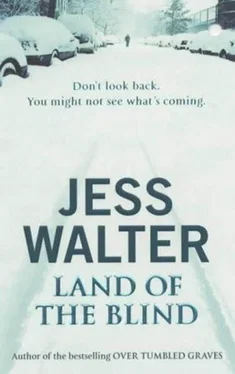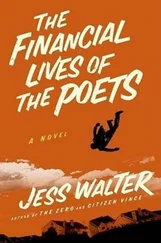Jess Walter - Land Of The Blind
Здесь есть возможность читать онлайн «Jess Walter - Land Of The Blind» весь текст электронной книги совершенно бесплатно (целиком полную версию без сокращений). В некоторых случаях можно слушать аудио, скачать через торрент в формате fb2 и присутствует краткое содержание. Жанр: Детектив, на английском языке. Описание произведения, (предисловие) а так же отзывы посетителей доступны на портале библиотеки ЛибКат.
- Название:Land Of The Blind
- Автор:
- Жанр:
- Год:неизвестен
- ISBN:нет данных
- Рейтинг книги:3 / 5. Голосов: 1
-
Избранное:Добавить в избранное
- Отзывы:
-
Ваша оценка:
- 60
- 1
- 2
- 3
- 4
- 5
Land Of The Blind: краткое содержание, описание и аннотация
Предлагаем к чтению аннотацию, описание, краткое содержание или предисловие (зависит от того, что написал сам автор книги «Land Of The Blind»). Если вы не нашли необходимую информацию о книге — напишите в комментариях, мы постараемся отыскать её.
Land Of The Blind — читать онлайн бесплатно полную книгу (весь текст) целиком
Ниже представлен текст книги, разбитый по страницам. Система сохранения места последней прочитанной страницы, позволяет с удобством читать онлайн бесплатно книгу «Land Of The Blind», без необходимости каждый раз заново искать на чём Вы остановились. Поставьте закладку, и сможете в любой момент перейти на страницу, на которой закончили чтение.
Интервал:
Закладка:
When the press conference ended, I watched the TV cameramen pack up their equipment; it was a bittersweet feeling, knowing I would never feel their hot lights on my face again, that their attention would move elsewhere, that I had run my last campaign.
It was two days before the election. I bought a fifth of whiskey, drank half of it in my car, and brought the rest to my campaign headquarters, which was in the process of being dismantled. (We were three months behind in rent.)
There was only one person in my office, a young volunteer named Lara. She cried as she watched movers pack up desks and computers, boxes of pins and bumper stickers.
"Mr. Mason," she said. "I'm so sorry."
"Thank you, Kayla," I said, and patted her on the head.
"Who is Kayla?" she asked.
"Hmm?"
"You called me Kayla."
"I did?" I thought about that clear-eyed girl, Kayla – who had magically appeared on the sidewalk outside the Triangle Pub, with that most basic of geometry solutions and the kind of advice Ben might have given: Go back to yourself.
I walked right past Lara, went outside, and looked up into the sky. I got in my car and drove east, across the river, to my parents' house on Empire Road. I parked in front and walked to the front window. My father was still awake. I could see him watching TV. Mom slept next to him on the couch. Dad saw me, got up, and opened the door. We stood on the porch looking at each other from opposite sides of the screen door. He had aged so much; I'd seen him a dozen times over the last decade, but I realized that I hadn't seen him in so long, hadn't seen anything. His calm blue eyes seemed to float in almond-shell lids; the creases around his mouth were dusted with gray whiskers.
"I lost," I said.
"Yeah," he said. Then he held the screen open for me.
And finally, I went inside.
5
After the election, I stayed in my parents' house for a few months, resting and getting my affairs in order, an exercise that mainly consisted of filling out stacks of paperwork chronicling various failures: divorce, bankruptcy, the sale of my house and other property, defensive filings with the Federal Election Commission and the IRS. But I also found time to talk to my parents about Ben, to explain my guilt and apologize for not being around all those years after he died.
My father mostly listened. My mother fed me. And the banks, creditors, and lawyers bled me, asset by asset, cent by cent, until there was nothing.
"They get the motorcycle, too?" my dad asked.
It was actually the last thing I had left. It was stored in a friend's garage in Seattle, and I had forgotten to list it in my dwindling assets. The next weekend I took the bus to Seattle, rode the bike home, and gave it to my dad. He tried to make me take it back, or sell it, but I insisted. The very next day he rode it to work. Unfortunately, it was only three months before the lawyers tracked the motorcycle down and took it away. I apologized to Dad, but hewaved his hand.
"I didn't like it anyway." He never mentioned the bike after that, but my mom said he rode it to work every day while he had it.
I continued to put my life back together. I hung a shingle in Spokane and began to practice law again – wills for people with nothing to leave behind, divorces for people with nothing to split. I got a little bit of contract work, enough to start paying my ex-wife, to get a very small apartment and an old Honda Civic. I stopped wearing the glass eye and put my patch back on. I grew my hair a little bit longer. I breathed. Ate. Walked. Talked a little. Was I better? I believed so. I made the mistake of thinking the trappings were my problem, the symptoms were my disease. I was poor, I thought, so I must be on my way to being whole again.
Then, more than a year after the election – this January, just a few weeks ago – I finally went to see Eli Boyle. Honestly, I wasn't angry with him. In some important way, I believed I deserved what he'd done. And yet I hadn't wanted to see him until then.
We imagine that time has qualities of its own, a weight and a girth, powers of redemption and recovery. We believe that time will fix or heal, or at least resolve. But sometimes the time just passes. The days go by and nothing changes, nothing.
I drove up the face of the South Hill. I turned on Cliff Drive and drove past the mansions to the end of the cliff, where the lesser homes clung to the tawny slope like billeted climbers. Eli's lawn and trees were overgrown, the house empty. This was all that was left of Empire Interactive. The employees had all been fired by Eli or had wandered away. Louis was the last to go, almost a year before. Since then, Eli had moved everything he could carry up to his carriage house apartment, where he still lived. He had painted EMPIRE INTERACTIVE on a small sign and posted it outside his door. Unlike me – and Michael and Dana, it turned out – Eli had been selling his technology stocks along the way, and he was keeping Empire on life support from the last of the money that he'd saved, hoping like all the surviving tech companies to make it through the long night until the money rose again.
I climbed the stairs and knocked on the door. Dead bolts slid, hooks were lifted, keys turned, and finally the door opened and he was standing there, shifting his weight from foot to foot. I hadn't seen Eli in sixteen months. He'd gotten heavier, his hair thinner, a dusting of red whiskers across his cheeks and chin. And there was something in his eyes, that darting; when he blinked it was like he was in pain, like he was trying to force glass from his eyes. He backed into his apartment. He had this way of scrunching up his nose to push his glasses up. He did this, they slid back, and he did it again. The room smelled like coffee, pizza, and body odor.
"I didn't want to do it, but you gave me no choice-"
"I know," I said.
"The whole thing, you running in the first place, it was my idea-"
"I know."
"And you brought that woman in-"
"I know, Eli."
"It's always you and me and then you always forget, you always forget-"
"I know, Eli. I won't forget anymore." I walked slowly around the apartment, Empire reduced to these stacks of boxes and binders at our feet. He grimaced as he backed slowly to his computer, still unsure, I suppose, just what I meant to do to him.
"It was… you… betrayed… I-" Eli seemed unglued, his eyes darting back and forth. "I couldn't let it go. You have to stand up sometimes. Fight back." His voice had no modulation, like an idling engine, and I could see that he was sick in some way.
"I'm not here to talk about that," I said. "That's all in the past."
He nodded unsurely and made a small whistling sound.
"I tried to call you, but your phone has been disconnected."
"It was tapped," he said. "I kept calling to have them get the bugs off, but they wouldn't so I finally just disconnected it." He pointed at the computer. "I have e-mail, but I think they're watching that, too."
"I'm here to see the game."
"It's not a game," he said. Again, the painful blink.
"I want to see it."
"It's not ready."
"I know it's not ready. It's never ready. But I need to see it, Eli."
He watched me for a few moments, then turned on his computer, opened a couple of files, and the game engine began loading. "It's very rough. Still having trouble with the transitions. It doesn't go very far into the action yet." He talked as he worked the keyboard. "Bryan left the pixel shaders in a terrible state, and… and-" He looked down through his glasses at the screen. "Just when I think I've finally gotten it to be organic, I see some other thing I didn't anticipate. It's that Michael Langford. I know there's more venture capital, but he won't release it-"
Читать дальшеИнтервал:
Закладка:
Похожие книги на «Land Of The Blind»
Представляем Вашему вниманию похожие книги на «Land Of The Blind» списком для выбора. Мы отобрали схожую по названию и смыслу литературу в надежде предоставить читателям больше вариантов отыскать новые, интересные, ещё непрочитанные произведения.
Обсуждение, отзывы о книге «Land Of The Blind» и просто собственные мнения читателей. Оставьте ваши комментарии, напишите, что Вы думаете о произведении, его смысле или главных героях. Укажите что конкретно понравилось, а что нет, и почему Вы так считаете.











